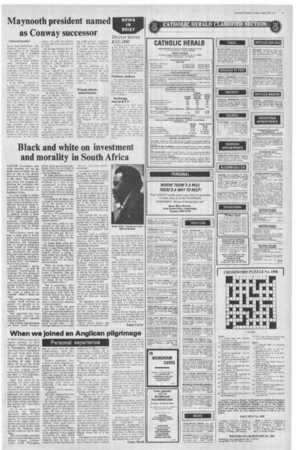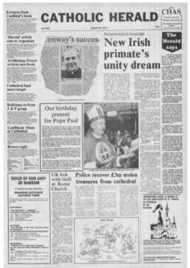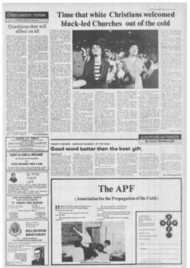Page 7, 26th August 1977
Page 7

Report an error
Noticed an error on this page?If you've noticed an error in this article please click here to report it.
Tags
Share
Related articles
Tragedy Impending In South Tfhroem Africa Unless...
Counter-propagandist In
Archbishop Hurley Of Durban Paints Grim Picture Of The...
Our Vested Interest In Apartheid
The Cloak Covering 1980's Apart
Black and white on investment and morality in South Africa
CLEVER economics and strict morality do not go easily hand in hand. An expert in one is not always renowned for his adherence to the other. That perhaps goes some way towards explaining the confusion that surrounds the question of financial investment in Southern Africa.
It is easy enough to understand the British Government's reluctance to do what, in principle, it says it would like to do. Sixty per cent of all foreign investment in South Africa is British, making this country by far the biggest single investor. In addition, Britain is South Africa's biggest trading partner. To reduce drastically the economic connections with South Africa could clearly have repercussions here. No British Government is keen to take that risk.
Nevertheless there has been a slight shift in British policy. As a result of pressure at this year's Commonwealth Conference, Mr Callaghan went on record as saying that some forms of economic pressure had not been ruled out. Meanwhile Dr David Owen has made some proposals to EEC countries regarding a code of conduct for investment in South Africa. Unfortunately this has been delayed.
It would be stupid and indeed immoral to write off economic considerations as irrelevant. But they should not alone dictate the policy either of governments or of Churches.
Here, surely, the Churches have a duty to give a clear lead, perhaps along the lines that the South African Council of Churches has recommended in the "code of ethics for investment" which it issued last week.
For one thing at least is clear enough: black Africans in general are opposed to investment, which they see as bolstering up an unacceptable system.
That opposition has been repeatedly stated by organisations which represent millions of blacks.
One of those organisations is the Black Allied Workers' Union, whose general secretary, Drake Koka, is now based at the Catholic Institute for International Relations.
Mr Koka describes the decision of the Westminster diocese to sell its shares in Consolidated Goldfields as a "step of encouragement" to black South Africans. And he strongly criticises the position adopted by the Jesuits, who are retaining their investments at least for the time being.
According to Mr Koko, this contradicts advertisements put out by the Society of Jesus emphasising the role of the Jesuits in "defending workers' and peasants' rights."
He says: "The advertisement presents them as martyrs for justice, but here they are maintaining injustice."
It may seem unfair to concentrate in this way on the Jesuits who, after all, have said that they may eventually sell the shares they have got. But it is important to realise the implications of their delay for the Church in South Africa.
As Drake Koka points out: "The Jesuits' decision will be a shock to many black Catholics in South Africa. While the Catholic Church is taking a stand within the country, they consider that the Church abroad is one with the South African Church.
"When the Jesuits refuse to sell their shares, they are indirectly supporting the immoral system of apartheid. They are contradicting the stand of the Catholic bishops. This weakens the image of the Catholic Church in South Africa."
That is particularly unfortunate at a time when black people have welcomed the new determination with which the Catholic Church has begun to resist apartheid, and in particular the Church's commitment to multi-racial education in Catholic schools.
For the Church has gone further than a simple decision to give the supposed benefits of white education to blacks: it has realised that such a move is not sufficient to cater for the new feelings of self-awareness that black people have the feelings expressed in the whole "black consciousness" movement.
As a result it is in the process of trying to devise a joint syllabus which will be suitable for all races. This could include, for example, tuition for all in black culture and languages.
Such a fundamental attack on apartheid principles has not gone unnoticed by the Government, which has appealed to the bishops not to go ahead. No official action has yet been taken against the institution of the Church as such. However, this does not mean that the Government is allowing the plans, or the Church, to go unmolested.
The reasons for its nonintervention on an institutional level are clear. First, it likes to present itself as a defender of Christianity in Africa and as such seeks as far as possible to avoid head-on collisions with the Church.
Second, such a collision would annoy the white Catholic electorate, especially as white parents have shown no resistance to the Church's educational proposals.
Instead, the Government is victimising leading individuals within the Church: it is no coincidence that in recent months two members of the secretariat of the South African Catholic Bishops' Conference Fr Dominic Scholten and Fr Smangaliso Mkhatshwa have had action taken against them, or that the Rev Aelred Stubbs, an Anglican clergyman who has worked in South Africa for 18 years, has been denied permission to re-enter the country.
What it amounts to is an unsubtle attempt to remove opposition by picking off the effective ledership
one by one, as it has tried to do with the militant student leaders.
But opposition will not fade away, as is shown by the renewed unrest in Soweto. Police threats to crush it by violence and the continued refusal to deal realistically with representative black organisations only make peaceful change more unlikely than ever.
More Church leaders will probably be among those to suf
fer from the Government's attack: the new general secretary of the South African Council of Churches, the Rev John Thorne, has said: "The State sees the Church as the greatest enemy." But he has reiterated the Church's determination to continue along the same rough road, "No Christian can reach a point where he accepts a situation as beyond redemption," he says: "All our involvement is an effort to make a non-violent change possible."
Such involvement takes courage. It makes it even more vital than ever that South African Christians are seen to have the backing of the worldwide Church.
Hence the urgency over the investments issue. The Jesuits say that they will announce their decision within six months. It is hard to see why they need that long, or indeed why there is a need for their own independent investigation, given the extent of evidence available.
South African blacks can be forgiven for thinking that the time for lengthy deliberation is past. What they want to see now is some positive decision.
John Carey
blog comments powered by Disqus









